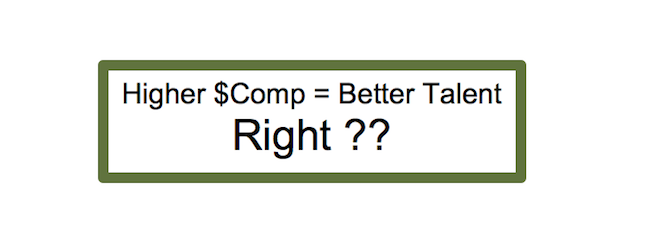If you pay more do you get more?
The simple answer is yes, higher compensation equals hiring better talent. However, hiring the right talent is not a simple event. The highest paid person is not always the best member of the organization. You can expect to have a poor result with the compensation of $1 dollar and a much better result with a compensation of $1 million but higher compensation does not always equal hiring better talent. We will consider several points when answering this question. The answer is complicated. Remember, the most complicated and complex part of any business is the people who work there. So, why shouldn’t the question require a complicated and complex answer?
Better compensation will attract better talent
Determining the right compensation amount for your company is very challenging today. The internet offers numerous resources that disclose compensation ranges for specific roles. Some of the data is accurate. A lot of the data is outdated and misleading to employers who want to lock into a compensation range. In the best case scenario, internet related compensation research provides data that can serve as a baseline, indicating what currently employed folks are earning. If your organization is seeking to acquire critical talent, then paying someone to leave their employment for another role is going to require that you will need to pay them more than they are currently making. Higher compensation will obviously attract a larger group of qualified candidates. However, just because your company is going to pay more does not on its own assure you that you will hire the right fit.
Wait, it is not all about compensation
Some of the members of today’s workforce want to work for a company where the employee feels they are making a difference and their work is appreciated. I have interacted with these kinds of people at both senior and junior levels. Paying them fairly is necessary, but it takes more than just money for them to want to join your company.
Are you finding that the discussion is straying into the gray zone? Simple economic rules should apply here, meaning that paying for a higher quality of talent would predictably deliver a better result every time. If it were only that simple. Remember, the most complicated and complex part of any business is the people who work there or the people who you want to work there.
Needing a process for the two sides to hiring
There are two parts to the hiring conversation that involve people. They are the employer side and the candidate side.
On the employer side, hiring managers can under-estimate the “market compensation” for the talent that they need. Hiring managers can also be blinded by their emotional attachment to their business and neglect to roll out the attributes of their company culture.
On the candidate side, there can be a tendency to tell a prospective employer that you can “do anything or learn anything” without investing the time to understand the business challenge needing to be solved by hiring you. In addition, candidates can spend way too much time rehearsing for the stale and outdated interview questions and neglecting to focus on inquiring about business issues while gaining a feel for the company’s culture.
First and foremost, best practice recruiting requires a process that starts with the employer defining and declaring the business challenge they need to be solved by hiring “the right”critical talent. Best practice hiring processes vet candidates for both technical capabilities and also a cultural fit. The hiring manager has to also recognize that to attract qualified candidates away from their current role, the hiring manager will have to pay qualified candidates MORE than they currently make.
Is your business hiring better talent?
Are you really thinking about how to acquire the right talent who can make a big difference in your business?
The key to getting it right is first recognizing that people are complicated and that hiring requires a process.
Hiring the right talent involves a process to identify the right technical and cultural fit while also offering the right compensation.
- As the hiring manager or CEO, have you audited your company’s recruitment process? Do you know how your company is presenting itself to prospective talented candidates?
- Do you have a process to reward employees for clearly defined deliverables in their work performance?
- Is your organization aligned to maximize the output of your employee’s performance?
- Are you clearly describing why someone would want to join your organization?
- Does your business have a clearly defined hiring process that concludes with the newly hired talent ready to begin their first six months with a plan of action on day one?

